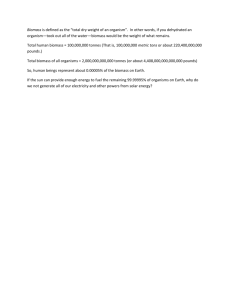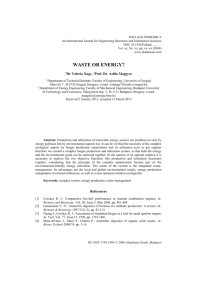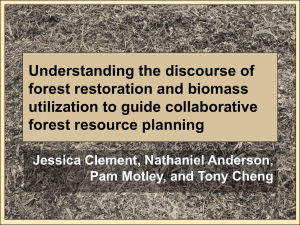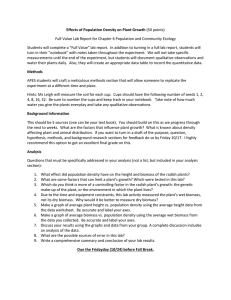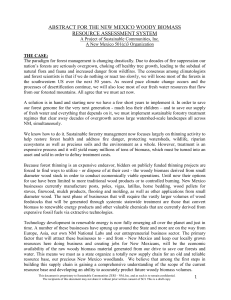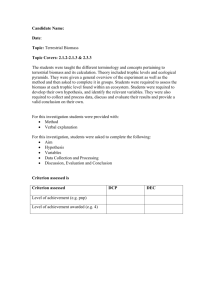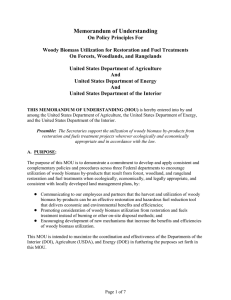USDA Forest Service Inter-Deputy Team Charter Woody Biomass Utilization Team
advertisement
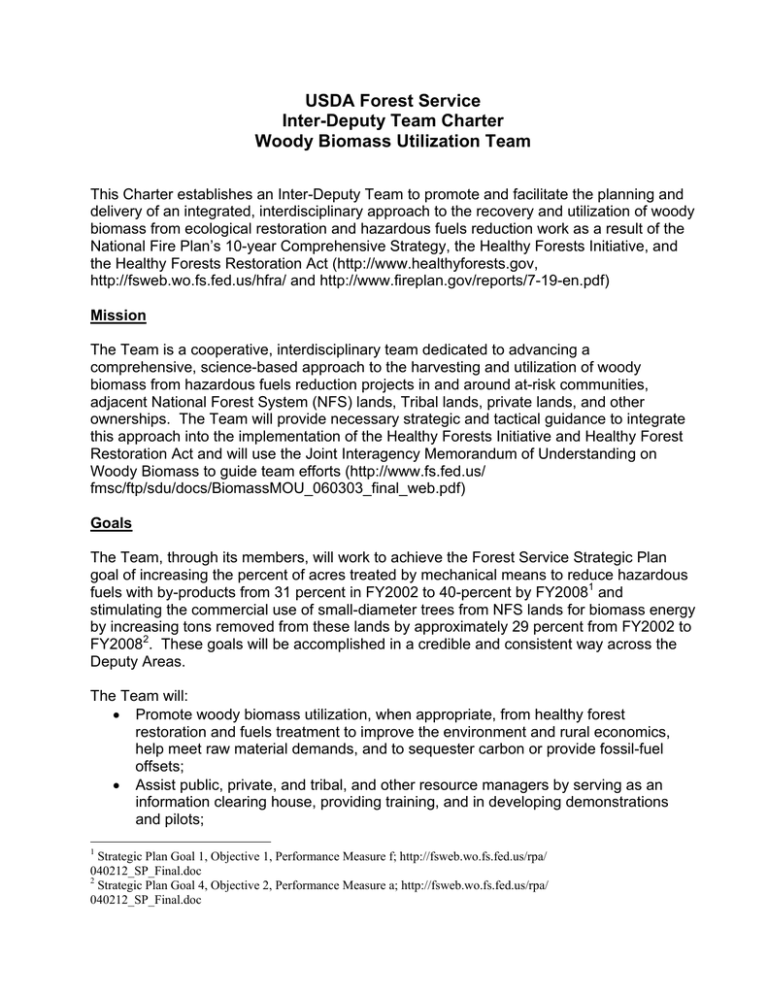
USDA Forest Service Inter-Deputy Team Charter Woody Biomass Utilization Team This Charter establishes an Inter-Deputy Team to promote and facilitate the planning and delivery of an integrated, interdisciplinary approach to the recovery and utilization of woody biomass from ecological restoration and hazardous fuels reduction work as a result of the National Fire Plan’s 10-year Comprehensive Strategy, the Healthy Forests Initiative, and the Healthy Forests Restoration Act (http://www.healthyforests.gov, http://fsweb.wo.fs.fed.us/hfra/ and http://www.fireplan.gov/reports/7-19-en.pdf) Mission The Team is a cooperative, interdisciplinary team dedicated to advancing a comprehensive, science-based approach to the harvesting and utilization of woody biomass from hazardous fuels reduction projects in and around at-risk communities, adjacent National Forest System (NFS) lands, Tribal lands, private lands, and other ownerships. The Team will provide necessary strategic and tactical guidance to integrate this approach into the implementation of the Healthy Forests Initiative and Healthy Forest Restoration Act and will use the Joint Interagency Memorandum of Understanding on Woody Biomass to guide team efforts (http://www.fs.fed.us/ fmsc/ftp/sdu/docs/BiomassMOU_060303_final_web.pdf) Goals The Team, through its members, will work to achieve the Forest Service Strategic Plan goal of increasing the percent of acres treated by mechanical means to reduce hazardous fuels with by-products from 31 percent in FY2002 to 40-percent by FY20081 and stimulating the commercial use of small-diameter trees from NFS lands for biomass energy by increasing tons removed from these lands by approximately 29 percent from FY2002 to FY20082. These goals will be accomplished in a credible and consistent way across the Deputy Areas. The Team will: • Promote woody biomass utilization, when appropriate, from healthy forest restoration and fuels treatment to improve the environment and rural economics, help meet raw material demands, and to sequester carbon or provide fossil-fuel offsets; • Assist public, private, and tribal, and other resource managers by serving as an information clearing house, providing training, and in developing demonstrations and pilots; 1 Strategic Plan Goal 1, Objective 1, Performance Measure f; http://fsweb.wo.fs.fed.us/rpa/ 040212_SP_Final.doc 2 Strategic Plan Goal 4, Objective 2, Performance Measure a; http://fsweb.wo.fs.fed.us/rpa/ 040212_SP_Final.doc • Encourage assessments of the biomass potentially available from public and private lands at appropriate landscapes scales so as to assist in planning and decisionmaking and to encourage sustainable investment in biomass removal and utilization; • Recommend strategies and actions so NFS lands can be perceived as a reliable supplier of biomass to local markets; • Interface and liaison with the Ecosystem Sustainability Corporate Team, Inter-Regional Ecosystem Management Coordinating Group, Inter-deputy Fuels Team, Administrative Management Council, White House Task Force on Energy Project Streamlining, Council on Environmental Quality, other agencies and departments, and others as appropriate; • Explore and encourage the sustainable development and stabilization of woody biomass utilization markets; • Encourage developing, sharing, and deploying of new technologies and mechanisms that increase the benefits and efficiencies of woody biomass harvesting and utilization; • Develop and highlight collaborative partnerships and projects that provide value and enhance the economics, successes, and opportunities for utilizing woody biomass; • Evaluate, develop, and encourage application of meaningful measures of successful outcomes in woody biomass utilization; • Provide liaison with interagency and inter-departmental efforts on biomass utilization; • Facilitate on-the-ground action and accomplishment; • Provide critical assistance to Staff Directors and Policy Makers in the Washington Office (WO) in meeting the Strategic Plan goals related to woody biomass utilization. More specifically, the Inter-Deputy Team will identify, and to the extent possible and practical, resolve barriers to planning and accomplishing woody biomass utilization from hazardous fuels reduction and restoration projects. At the national level, the Team will focus its efforts in integrating across programs in the areas of policy and program development and implementation, communication, budget and finance, and where other potential barriers may be found to exist. At the field level, the Team will be a source for technical information, assistance in developing new approaches, and sharing accomplishments. Specific issues associated with the development of an integrated approach will be brought to the attention of the Staff Directors, National Fire Plan Office, and Deputy Chiefs in a consistent and coordinated manner. Priority Actions The above activities are critical to accomplishing the 40-percent utilization goal and will be completed over the next 24 months. However, there are some immediate actions that are critical, and will be prioritized: 3 • • • Provide leadership in establishing an inter-departmental coordinating effort (1 month) Establish technical information exchange program including website, clearing house, newsletter, and forums (2 months) Develop recommendations for comprehensive agency strategy for biomass utilization (6 months) Organization and Operations A team will consist of members from the following staffs, Deputy Areas and/or programs: National Forest Systems Forest and Range Management Technology and Development Centers Lands Watershed and Air Management Minerals and Geology Management Fish, Wildlife and Rare Plants Region or Forest Representative Forest Management Service Center State and Private Forestry Cooperative Forestry Fire and Aviation Management National Fire Plan Office Forest Products Lab Marketing Unit National Interagency Fire Center Research & Development Vegetation Management and Protection Research Resource Valuation and Utilization Research Wildlife, Fish, Water and Air Research Programs, Legislation and Communication Business Operations Note that because of the high number of participants and representatives, a Core group will be derived from this Team to provide the needed leadership to ensure focus, performance, and responsiveness to rising issues. Additional Team members may be brought on board depending on the specific issues being addressed at any given time by the Team. The Team will provide coordination for a larger group within the Washington Office and the field who have interest in promoting the utilization of wood. 4 Team membership will demand dedication to the issues of the team on a part-time basis. The Team will strive to achieve positive results in its integration within the first six to nine months. During this time, there will be formal, periodic progress evaluations with the Deputy Chiefs, National Fire Plan Office, and ESCT to determine if the Team’s structure, focus and Charter are working or if changes need to occur. The tenure of the Team has been tentatively identified as 24 months. Approval I, the undersigned, on behalf of the Ecosystem Sustainability Corporate Team endorse and charter the Woody Biomass Utilization Team and commit to the missions and goals of the Team. Date: August 17, 2004 Jim Reaves Chair Ecosystems Sustainability Corporate Team
